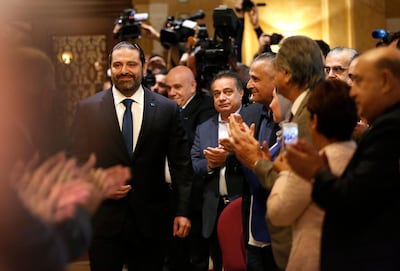New US sanctions on senior Hezbollah figures on Tuesday, including two of the Shiite group’s parliamentarians, signalled a further escalation in the confrontation between Washington and Tehran over the nuclear deal.
In Beirut, Hezbollah’s demands that the state responds in solidarity with the group is set to deepen an internal political crisis undermining confidence in the country’s economy and financial system.
The Lebanese state has fallen increasingly under Hezbollah’s influence since the assassination 14 years ago of Rafic Hariri, the late Sunni statesman with worldwide stature and father of the current prime minister, Saad Hariri.
Saad remains favoured by the markets over any outright or indirect Hezbollah, and by extension Iran-backed, replacement. This is partly because he has used his international connections to seek economic help for the country.
That help, which in theory exceeds $11 billion pledged for infrastructure and other projects at an international conference in Paris last year, is contingent on difficult budgetary and other reforms, with donors beginning to express disappointment about the lack of their implementation. The funds are supposed to be distributed over a period over four years but no date for their launch has been set.
In a sign of lack of confidence, Beirut’s Blominvest Bank said the number of property transactions in Lebanon fell 17.4 per cent in 2018. The decline continued this year, with prices in the first quarter of 2019 dropping almost nine per cent compared with the same period last year, according to Global Property Guide. Raja Makarem, a prominent Lebanese real estate consultant in Beirut, said the market was “in crisis”.
International help for the economy could now be more far fetched because of political divisions set to be furthered by the US sanctions on Hezbollah MPs Mohammad Raad, the equivalent of a party whip, and Amin Sherri, an apparent darling of the Islamic Revolutionary Guards Corps (IRGC), as well as top security enforcer Wafiq Safa.
Hezbollah immediately portrayed the sanctions as an attack on Lebanon’s sovereignty. The group’s elusive leader Hassan Nasrallah is due to make a speech on Friday.
Lebanon’s Maronite president Michel Aoun will be under pressure to support the group that aided his rise to the presidency with its support. President Aoun said on Twitter that Lebanon regrets the US measures against what he described as two elected MPs.

Nabih Berri, the Shiite speaker of parliament, has called the sanctions an affront to the whole legislature. But Mr Berri is a seasoned political wheeler dealer.
His Amal movement stands to gain from a possible thrust to the political forefront from any international undermining of Hezbollah, unless the US sanctions, which have an anti-corruption dimension, end up hitting Amal.
For the first time, the sanctions extended to sitting Hezbollah MPs, widening a rift between the US and Europe on how to deal with Tehran over the 2015 deal, from which Washington pulled out last year.
Within European policymaking and advisory circles, increasingly vocal sympathisers of Tehran say Hezbollah as a quasi-political entity, together with Iraqi Shiite militias that had entered parliament in Baghdad, should not be sanctioned.
The so-called realists argue that MPs from these militias imbue their groups with legitimacy and that sanctions would compromise lines of communications between the militias and European capitals.
Germany is among the strongest proponents of this approach but, even in Berlin, critics say Europe is giving Shiite militias immunity from unchecked violence they commit in Lebanon, Syria and Iraq by devising arcane distinctions that bear no relation to how the militias operate.
They point to Hezbollah’s suspected involvement in the killing of prominent Lebanese figures, as well as support for Syrian President Bashar Al Assad in the crackdown against the Syrian masses, as well as the sieges and forced population transfers of majority Sunnis in the ensuing civil war.
European countries have been primarily behind the international efforts to help Lebanon deal with the economic pressures. But market confidence further shook in the wake of a violent intercommunal feud two weeks ago that forced Mr Hariri to cancel a regular cabinet meeting, and possibly the next.
The sanctions could strengthen Mr Hariri’s position that Lebanon can no longer afford Hezbollah’s open backing for Tehran, anti-Saudi rhetoric and boastful defiance of United Nations resolutions that demand the disbanding of all the armed groups in Lebanon.
Although Mr Hariri says he is defending the national interest, the beleaguered prime minister is personally scarred by Hezbollah, with suspected Hezbollah operatives being tried in absentia by a UN tribunal in The Hague for their involvement in the 2005 assassination of his father.
Among the 22 people killed in the assassination was former finance minister Bassel Fleihan, one of Lebanon’s foremost public financial minds. Hezbollah has refused to hand over the four suspects to The Hague, saying the group is being framed for the killing.
In detailing the sanctions, the US Treasury said Mr Sherri, one of the two MPs sanctioned, had pressured Lebanese decision makers and banks, citing a case where it said Mr Sherri “threatened Lebanese bank officials and their family members after the bank froze the accounts of US-designated Hezbollah member”.
The IRGC singled out Mr Sherri for praise after he was re-elected last year. A photo published by the Saudi-owned broadcaster Al Arabiya showed IRGC general Qassem Soleimani with his hand over Sherri’s shoulder.
Lebanon is a key battleground in the geopolitical posturing between the United States and Iran. Defusing the country’s political and economic strains will depend on how far Hezbollah is prepared to use its power to twist the arm of its allies and rivals alike in taking an anti-US stance, which would compromise confidence and make donors more wary about supporting a weak central government.


